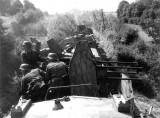
World War II: 60 Years After 2005 / La bataille du rail / France 1946
A film, both documentary and feature, about the single-minded struggle of French railway workers against German occupying forces during the Second World War. In succinct dramatic sequences, extreme situations (e.g. the execution of one of the resistance fighters, persecution, the destruction of a military train) are combined with lightly comic scenes. Awarded the Grand Prix in Cannes in 1946.

The Cannes IFFwas re-launched in 1946. The award for Best Direction surprisingly went to the unassuming, half-documentary, half-feature film The Battle of the Rails by director René Clément. The newly established company Coopérative Générale du Cinéma Français, supported by the railway workers resistance organisation Résistance-Fer, chose Clément as a director, since they were acquainted with his short films, which also included first-rate documentaries about the daily life of railway workers. The initial aim of both the company and the director, namely to bear testimony to the role played by French railway workers in the fight against the German occupation, grew into a collective drama. In amongst the documentary footage, the director quite spontaneously interwove acted sequences, which retain the same degree of authenticity as the documentary shots. With very few exceptions, the film’s protagonists are non-actors, actual railway workers.
78 min / Black & white, 35 mm
Director René Clément
/ Screenplay René Clément, Colette Audry
/ Dir. of Photography Henri Alekan
/ Music Yves Baudrier
/ Editor Jacques Desagneaux
/ Production Coopérative Générale du Cinéma Français
/ Cast Jean Clarieux, Jean Daurand, Jacques Desagneaux, Pierre Latour
/ Contact Národní filmový archiv, Institut national de l`audiovisuel

René Clément (1913, Bordeaux-1996) studied architecture at Paris’s Academy of Fine Arts. From the mid-1930s on he began to work as a cameraman and director of documentary films. During the occupation he was involved in the resistance movement while, at the same time, documenting the French resistance with his film camera. After the war, these shots became the basis for his first feature, The Battle of the Rails, considered the first neorealist work. The war also underlies what is probably his most important film, The Secret Game (Les jeux interdits, 1951), here present in the conduct and behaviour of innocent children. The film was awarded at Cannes in 1952 and also won the Venice Grand Prix that year, and in 1953 it won an Oscar. Clément’s filmography in the following years contains works of varying genres. Apart from an adaptation of Zola’s novel The Kill under the title Gervaise, he made comedies (Knave of Hearts / Monsieur Ripois; The Joy of Living / Che gioia vivere; Joy House / Les félins) and crime stories (Purple Noon / Plein soleil; Rider on the Rain / Le passager de la pluie, etc.). The majority of his films were popular with audiences. The critics acknowledge Clément’s excellent technical skills, but condemn his films’ somewhat impersonal aloofness.
Národní filmový archiv
Závišova 5, 140 00, Praha 4
Czech Republic
E-mail: [email protected]
Institut national de l`audiovisuel
83-85, rue de Patay, 75013, Paris
France
Phone: +33 1 498 320 00
E-mail: [email protected]

Briana Čechová
Film Institution Rep.
First-hand brews throughout the year.
Be among the first to learn about upcoming events and other news. We only send the newsletter when we have something to say.